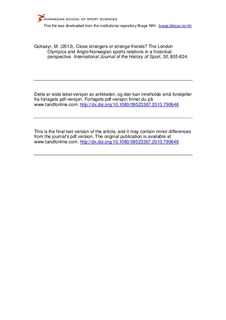| dc.contributor.author | Goksøyr, Matti | |
| dc.date.accessioned | 2014-11-07T11:59:40Z | |
| dc.date.available | 2014-11-07T11:59:40Z | |
| dc.date.issued | 2013-05 | |
| dc.identifier.citation | International Journal of the History of Sport. 2013, 30, 805-824 | nb_NO |
| dc.identifier.uri | http://hdl.handle.net/11250/225467 | |
| dc.description | I Brage finner du siste tekst-versjon av artikkelen, og den kan inneholde ubetydelige forskjeller fra forlagets pdf-versjon. Forlagets pdf-versjon finner du på www.tandfonline.com: http://dx.doi.org/10.1080/09523367.2013.790646 / In Brage you'll find the final text version of the article, and it may contain insignificant differences from the journal's pdf version. The definite version is available at www.tandfonline.com: http://dx.doi.org/10.1080/09523367.2013.790646 | nb_NO |
| dc.description.abstract | This article studies similarities and disparities between the two nations England and Norway as they could be observed before and during the London 2012 Olympics, and discuss them in the historical perspective of geopolitical and sportive relations. The main perspective is how these relations have been seen and experienced from Norway. The article also studies whether the London Olympics of 2012 did present new forms of relationships between the two geographical neighbours. The article discusses the role of ball games, preferably team handball at the 2012 Games, as one example of where sporting interests differ. The article reflects upon these matters in a historical context. It builds upon traditional historical methods, document and media analysis. It also looks at the 2012 London Olympics against the background of the former London Games of 1908 and 1948, and the overall historical sports relations between England, ‘land of sport’ and a small country like Norway, who generally has been on the receiving end of these interchanges. Such asymmetric relationships invite to a critical use of perspectives like cultural imperialism and post-colonialism. The article discusses whether such perspectives can be fruitful also when one discusses matters between the so-called First World nations. As the title of the article indicates, Norway and England are both close, politically and culturally, while also being strangers to one another, e.g. in parts of the sports culture. The 2012 Olympics seemed to reinforce this impression. | nb_NO |
| dc.language.iso | eng | nb_NO |
| dc.publisher | Taylor & Francis | nb_NO |
| dc.subject | olympic games | nb_NO |
| dc.subject | history | nb_NO |
| dc.subject | London | nb_NO |
| dc.subject | Norway | nb_NO |
| dc.subject | sports | nb_NO |
| dc.subject | geopolitics | nb_NO |
| dc.title | Close strangers or strange friends?: the London Olympics and Anglo-Norwegian sports relations in a historical perspective | nb_NO |
| dc.type | Journal article | nb_NO |
| dc.type | Peer reviewed | nb_NO |
| dc.subject.nsi | VDP::Humanities: 000::History: 070 | nb_NO |
| dc.subject.nsi | VDP::Social science: 200::Social science in sports: 330 | nb_NO |
| dc.source.journal | International Journal of the History of Sport | nb_NO |
| dc.description.localcode | Seksjon for kultur og samfunn / Department for Cultural and Social Studies | nb_NO |
